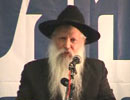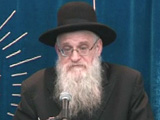- Sections
- Parashat Hashavua
544
Without the textual break, we are to read our parasha as a direct continuation of the end of Parashat Vayigash: "Israel lived in the Land of the Egypt, in the Land of Goshen, and they settled it, and were fruitful and multiplied there greatly." Rashi points out that the term for settlement was one which shows a strong connection to the land. The family no longer felt as strangers in a foreign land and found themselves all over the land. This was seemingly an ideal situation, which leads to our parasha: "Yaakov lived in the Land of Egypt," which sounds like the wandering Yaakov finally was able to live in tranquility.
On the other hand, there is no mention of the continuation of Yosef’s career. What happened to the relationship with the king who had said about him: "There is no one as wise and smart as you" (ibid. 41:39)? In the one recorded interaction, through an intermediary, Yosef had to plea to fulfill his promise of burying his father in his homeland. We see hints of Yosef’s influence waning. After the Hebrew made his great contributions, he was less the subject of adoration, and he and his people were more the subject of jealousy, peaking with the statement that started the enslavement: "Let us deal wisely with them lest they multiply and ... join our enemies" (Shemot 1:10).
How interesting it is that specifically Yosef, even when he was at the height of his success, was the one who sensed in advance the stormy situation ahead and was able to warn his brothers. He coached them to not become too entrenched in Egyptian life, but to stay in a separate region. Both Yaakov and Yosef gave instructions to the family to remember the time that they will return home to the Land of their forefathers and to bury their respective remains there, in the case of Yosef, at the time of national deliverance. It was Yosef, the great believer, whose eyes were not blinded by success, who passed on the code to deliverance: the words "pakod yifkod," which would be used by the eventual savior.
This has been the challenging necessity in each exile and time period, whether in Egypt, Babylonia, Spain, Germany, or Poland: always cling to our unique identity and wait for redemption, without being blinded by the successes of the golden periods. Look during bright days for the clouds that foretell stormy weather ahead and cling to the hope of redemption while weathering the storm.

Providing Non-Kosher Food
Various Rabbis | 5774

Shehecheyanu, Clothes, and Renovations During Sefira
Rabbi Daniel Mann

Shehecheyanu, Clothes, and Renovations During Sefira
Rabbi Daniel Mann

Should I Limit How Much Tzedakah I Give?
Rabbi Yirmiyohu Kaganoff | Kislev 5768
Daf Yomi Makkot Daf 22
R' Eli Stefansky | 2 Iyar 5785

P'ninat Mishpat: Rental of an Apartment that Was Not Quite Ready – part II
based on ruling 82031 of the Eretz Hemdah-Gazit Rabbinical Courts
Beit Din Eretz Hemda - Gazit | Iyar 5784








